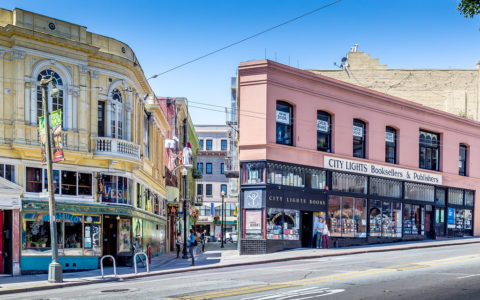In the latest SHuSH newsletter, Kenneth Whyte remembers book searches before the internet got commercial:

“Beat Ground Zero San Francisco 2014” by Mobilus In Mobili is licensed under
Back in the late twentieth century, I used to build my vacations around book searches. Before going to any new town, I’d make a list of new and used bookstores and hit the best of them during my stay. There was a genuine excitement about entering each store: you never knew what you were going to find, and you were acutely aware that at any moment you might see something you’d never seen before or something you might never see again.
It was especially the fear of blowing that one chance of acquiring something special that turned me into a book hoarder. (I was never disciplined enough to be a collector; I only bought for my own use). Over the years, I accumulated tens of thousands of books. I’d rummage through them, once or twice a decade, and throw out the ones that no longer interested me to make room for new acquisitions. There were always new acquisitions, whether I was traveling or not.
Then came the internet and suddenly the whole concept of book scarcity blew up. Amazon had every new title one could want. I still go to my favorite bookstores when I travel — Daunt’s in London, Prairie Lights in Iowa City, Three Lives & Co. in Manhattan (the world’s most perfect small bookstore), Politics & Prose in DC, City Lights in San Francisco, The Last Bookstore in LA (further below), to name a few. I make the visits (none in the past two years) in part out of a sense of nostalgia for the waning era of brick-and-mortar, and also because well-curated shops often suggest books I might otherwise overlook.
Looking for books on vacation was always one of my habits, and before Amazon came along, I’d carefully search for bookstores along the route we’d be driving during our holiday and I rarely came back without a few armfuls of books. These days, especially since the era of lockdowns began, book stores are mostly just a memory … which is just as well in some sense because I have no disposable cash to spend on fripperies any more.
Of Ken’s list of favourite stores, I’ve only visited City Lights in San Francisco, back in early 1991. It was, bar none, the busiest bookstore I’d ever been in in my life. It rather felt like a record store (remember those?) on a big album release weekend than a staid, stodgy bookstore.
The internet also allowed used bookstores to put their wares online, and Bookfinder.com came along to organize their inventories. Bookfinder.com is a meta-search portal that allows book shoppers to scan the inventories of 100,000 booksellers at once. Type in a title and it will cough up an array of purchasing options: new, used, good condition, poor condition, former library copy, first edition, signed, etc. You compare editions and prices, make your choice, and click through to the bookseller’s site to finalize your purchase.
Bookfinder was launched by a Berkeley student named Anirvan Chatterjee in 1997, just a couple of years after Amazon was born. Chatterjee sold out to AbeBooks in 2005.
AbeBooks is a Canadian tech success story, originally operated out of Victoria by Rick & Vivian Pura and Keith & Cathy Waters. It is a digital marketplace that allows you to search the stock of a wide variety of established retailers. What differentiates it from Bookfinder is that you make your purchase right on the AbeBooks site. AbeBooks also sells the books it represents on other platforms, including eBay, Barnes & Noble, and Amazon. AbeBooks, in short, is a retail business while Bookfinder is a search tool.
AbeBooks was a dangerous discovery for me, and I bought a lot of books through them for a couple of years after discovering the service. Today, of course, not so much, especially as the shipping charges frequently run higher than the initial purchase price of the books themselves. Initially an independent service, AbeBooks is now owned by Amazon.
These days a lot of people want to shop for books anywhere but Amazon or its subsidiaries. For a non-Amazon version of AbeBooks you might try Alibris, founded by Martin Manley in California in 1997 (it’s been passed around to a range of venture capitalists and holding companies and is now in the hands of private investors). Biblio.com is another marketplace, serving mostly collectors. For non-Amazon alternatives to Bookfinder, viaLibri is a slick search tool that I only recently discovered, although it’s not quite as comprehensive as Bookfinder. Bookgilt is a good meta-search site for antiquarian and rare books. For new books, the best alternative to Bezos is your local bookstore, which can get you almost anything you need. See the map at the very bottom of this page or go to Bookshop.org or Indiebound.org. Or you can visit one of the chains, Chapters/Indigo or Barnes & Noble.
I still start most of my used book searches on Bookfinder. It’s old technology, Web 1.0, as hopelessly dated as the Drudge Report, but it works. I find it easy to navigate and it offers far more listings (and more information on each listing) than Amazon. I order from its smaller independents whenever practicable, although it’s often difficult to know exactly who you’re ordering from because the smaller shops are frequently represented on Bookfinder by their resellers, AbeBooks, Alibris, Amazon, and Biblio.



